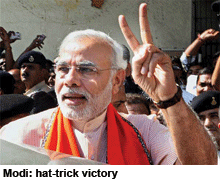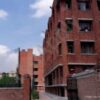Gujarat: English infirmity
After a hat-trick victory at the hustings, and sworn-in as chief minister of the western seaboard state of Gujarat (pop. 60 million) for a record fourth time in a row on December 26, Narendra Modi’s retention of stewardship of the state — widely trumpeted as the fastest (economically) growing in the country — has been cautiously welcomed by the academic community.
 Though seven of his ministers fell by the wayside, the Modi-led ruling BJP secured 115 of the total 182 seats in the legislative assembly. The top brass of the national BJP, J. Jayalalithaa (Tamil Nadu), Shiv Sena’s Uddhav Thackeray and MNS leader Raj Thackeray were present at the swearing in — clear indication of the emergence of Modi as a national leader.
Though seven of his ministers fell by the wayside, the Modi-led ruling BJP secured 115 of the total 182 seats in the legislative assembly. The top brass of the national BJP, J. Jayalalithaa (Tamil Nadu), Shiv Sena’s Uddhav Thackeray and MNS leader Raj Thackeray were present at the swearing in — clear indication of the emergence of Modi as a national leader.
Dr. Akshai Agrawal, vice chancellor of the Gujarat Technological University, believes that Modi’s re-election will ensure continuity of the process of raising education standards in the state to global norms. “As in so many fields, Gujarat is also trying to benchmark itself against the best in education globally. This objective has been set by the chief minister who has created the framework for this development,” says Agrawal.
Dr. Shirish Kashikar, director of the National Institute of Mass Communication and Journalism, Ahmedabad, is also impressed by Modi’s emphasis on education upgradation. “It goes to his credit that his government has promoted several new institutions of excellence. I can name at least two — Indian Institute of Teachers Education, and the Children’s University. Although in a nascent stage, both have great potential,” says Kashikar.
Although the unputdownable — all charges relating to his instigation or even connivance with the dreadful anti-Muslim riots of 2002 in the state have failed to stick — chief minister’s critics allege that education is a low priority item on Modi’s agenda, during his decade-long stint in power, several institutions of super specialisation have sprung up in Gujarat. Among them: the Pandit Deendayal Petroleum University (2001), Gujarat National Law University (2003), Dhirubhai Ambani Institute of Information Technology (August 2001), The Indian Institute of Technology (2008), Gandhinagar, National Institute of Fashion Technology (2004), Central University of Gujarat (2009), Gujarat Institute of Disaster Management (2004), Gujarat Forensic Sciences University (2009) and the Raksha Shakti University (2009). Academics in the state believe that more institutions of excellence are on the re-elected chief minister’s agenda of the next five years.
According to the chief minister’s aides, Modi believes that institutions of learning in the state should not only measure upto national standards but go a step further to compete with the best globally. “If we are to scale new heights of development and take our nation to its predestined mantle of the jaggad guru (world leader), robust progress in our education sector will play a major role. Education is the backbone of the nation’s progress. From the time a child enters primary school till he completes graduation and beyond, it is essential to provide top quality education facilities to our youth,” said Modi on the occasion of inaugurating the Gujarat Forensic Sciences University (2009), described by him as “the only university in the world dedicated to forensic and investigative sciences”.
However the intelligentsia in Gujarat is not wholly convinced that Modi — a former RSS pracharak and hardliner — is in favour of contemporary secular education. Writing in the business daily Mint (December 15), well-known and insightful columnist Aakar Patel attributes the inability of Gujarat to attract the IT (information technology) and ITES (IT enabled services) industries to Modi’s faulty education policy, particularly neglect of English language learning, at the behest of the RSS. “The lack of English means that Gujarat still doesn’t have a proper middle class as Mumbai, Delhi, Bangalore do. No white collar anglicised urban Indians like readers of this paper. It is why there is little social mobility for the lower middle class… it is also why Gujarat is able to offer zero intellectual resistance to the crude bigotry of the Bharatiya Janata Party. There is little sophistication of thought in the absence of English,” writes Patel.
Nevertheless even Patel concedes that over the past decade Modi has been conspicuously successful in attracting and developing the manufacturing industry in Gujarat which has averaged 9 percent growth for the past three years. Maintaining industrial development momentum requires modern education — including English learning. This is the silver-lining to one more innings for the BJP in India’s fastest growing economy.
R.K. Misra (Gandhinagar)
















Add comment